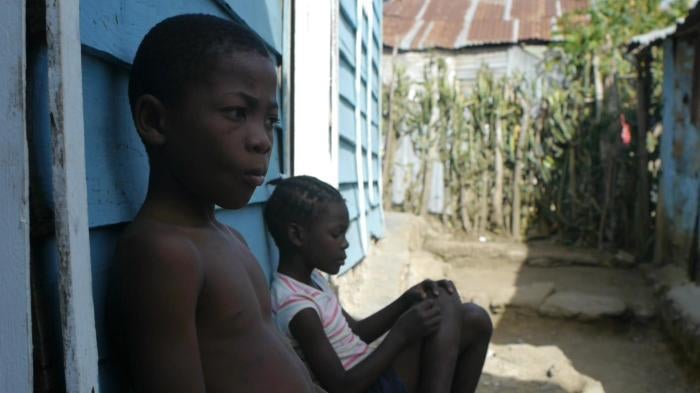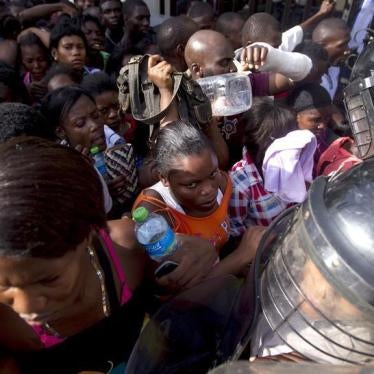(Santo Domingo) – Tens of thousands of Dominicans of Haitian descent remain in legal limbo, unable to exercise their basic rights, Human Rights Watch said in a report released today. The situation remains unresolved despite government efforts to remedy it.
The 43-page report, “We are Dominican: Arbitrary Deprivation of Nationality in the Dominican Republic,” documents hundreds of cases from 13 provinces around the country. Human Rights Watch found that Dominicans of Haitian descent are still unable to access basic civic functions such as registering children at birth, enrolling in school and college, participating in the formal economy, or travelling around the country without risk of expulsion.
“The Dominican Republic is denying tens of thousands of citizens their right to a nationality, and despite mixed messages, people are being detained and shoved over the border,” said José Miguel Vivanco, Americas director at Human Rights Watch. “The government needs to immediately stop expelling Dominicans of Haitian descent, and guarantee them their rights.”
Human Rights Watch conducted research in the Dominican Republic between February and May of 2015, interviewing over 100 victims, community leaders, legal experts, government officials, and representatives of local human rights organizations. Human Rights Watch documented over 60 cases in which Dominicans of Haitian descent were arbitrarily detained, and in some instances forcibly removed to Haiti, despite having proper Dominican documentation. Human Rights Watch also verified hundreds of cases in which Dominicans of Haitian descent are still unable to exercise full rights as Dominican citizens.
In 2013, the Dominican Constitutional Tribunal, the country’s highest court of appeals on constitutional matters, summarily removed citizenship from tens of thousands of Dominicans, based on a retroactive reinterpretation of the country’s nationality law. It ruled that although the Constitution provides that Dominican citizenship is a birthright to anyone born in the Dominican Republic between 1929 and 2010, those born to parents who were in the Dominican Republic as undocumented migrants at the time of their birth were not covered by this constitutional protection, and were, retrospectively, not citizens. This decision violated international human rights law and made thousands of people vulnerable to expulsion.
In 2014, President Danilo Medina’s administration attempted to mitigate the high court ruling with a “Naturalization Law” aimed at remedying the situation. However, the law has been fraught with design and implementation flaws that have thwarted the re-nationalization process.
In the case of Dominicans of Haitian descent whose citizenship was already a matter of record with the government, Human Rights Watch found that government agencies responsible for civil registries have refused to restore original nationality documents. Instead, officials have begun segregating those affected by the 2013 decision into completely new civil registries. This so-called transcription process is unnecessary, takes a huge amount of extra work for government authorities, and as a result is causing delays that keep thousands of people from being able to exercise their full citizenship rights.
Moreover, military and immigration authorities have repeatedly profiled Dominicans of Haitian descent, detaining and forcibly expelling them, even when they possess valid Dominican documentation.
In the case of Dominicans who had not yet been able to register with the government, Human Rights Watch found that Dominicans, mostly children, are being forced to register as “foreigners” in order to be naturalized as Dominican citizens, violating their rights. Onerous documentation requirements summarily excluded many from registration, especially given the brief 180-day implementation window.
This process appears to have disproportionately affected children whose mothers lack identity papers and could not obtain documentation before the February cutoff. Additionally, military and immigration authorities have harassed, detained, and expelled people trying to register.
To further complicate implementation of the Naturalization Law, since 2014, the government also has been carrying out a “regularization” plan for undocumented Haitian migrants who went to the Dominican Republic from Haiti for work. The Dominican government has offered migrants an opportunity to obtain temporary workers permits. While the effort is laudable, this process has also been rife with design and implementation failures.
The Dominican government should immediately restore the full nationality of all those affected by the 2013 decision, and ensure they are protected from expulsion to Haiti. The government should develop deportation procedures consistent with international standards, which examine and adjudicate on the individual case for each person who may lawfully be deported, and preserve family unity.
“In the past year, the administration of President Medina has taken some steps to address the situation of tens of thousands of Dominicans of Haitian descent,” Vivanco said. “While the government’s naturalization efforts have been positive, it needs to call a halt to wholesale expulsions and threats while it fixes the process.”
Selected Cases
On February 19, Wilson, 25, was detained near the town of Mao. Officers refused to let him go to his house nearby to get his Dominican birth certificate. They forced him onto a truck, took him the border town of Dajabón, and ordered him and 32 other detainees to walk across the border into the town of Ouanaminthe, Haiti.
He had never been in Haiti, and had no money, no means of communication, and no identification with him. Wilson’s employers got his birth certificate and met him at the office of the General Directorate of Migration office at the border in Dajabón. The immigration official in charge claimed that despite a valid birth certificate, Wilson was Haitian and refused to give him a letter granting passage back to his home in the Valverde province. Wilson was able to get home through multiple checkpoints accompanied by his employers and showing his birth certificate.
Karina, 35, was born in the Dominican Republic to Haitian parents, and registered as Dominican. Although she obtained a valid identification card at 18, when she was 24, the government refused to issue her documents necessary to enroll in a university, allegedly because her claim to nationality was under investigation. Unable to continue her studies, Karina began working as a chambermaid in a large beach resort, where she has been for 10 years.
In October 2014, Karina made a two-hour trip from the province of Altagracia, where she lives, to the capital for an interview concerning the validity of her nationality. Officials were satisfied with her responses, but told her that she couldn’t renew her identification card until the auditing process was finalized. She has taken time off work to make four more trips to Santo Domingo to check on the status of her case. Then, in early 2015, officials told her the process had been transferred to El Seibo, the province where Karina was born. As of late April, her audit was still not complete.
Because Karina has been unable to renew her identification card, which expired last fall, she says she cannot use her medical insurance, and must pay out of pocket when she goes to the doctor. She no longer has full access to her bank account or her credit card, and has had trouble paying both outstanding utility bills and the mortgage on her house. And she still can’t continue her studies.
Rosanna, 17, was born in the Dominican Republic to Haitian parents who had migrated from Haiti 20 years earlier. After the 2013 denationalization decision she was forced to quit public school and now picks and sells fruit in the countryside for less than US$3 a day. Rosanna wanted to register under the Naturalization Law, but was unable to do so. Faced with an inscrutable bureaucratic process, and unable to afford a lawyer, she turned to thinly stretched nongovernmental organizations, which couldn’t help her complete the process by the deadline. She is now unable to register as a Dominican citizen, and has no way of continuing her studies.









